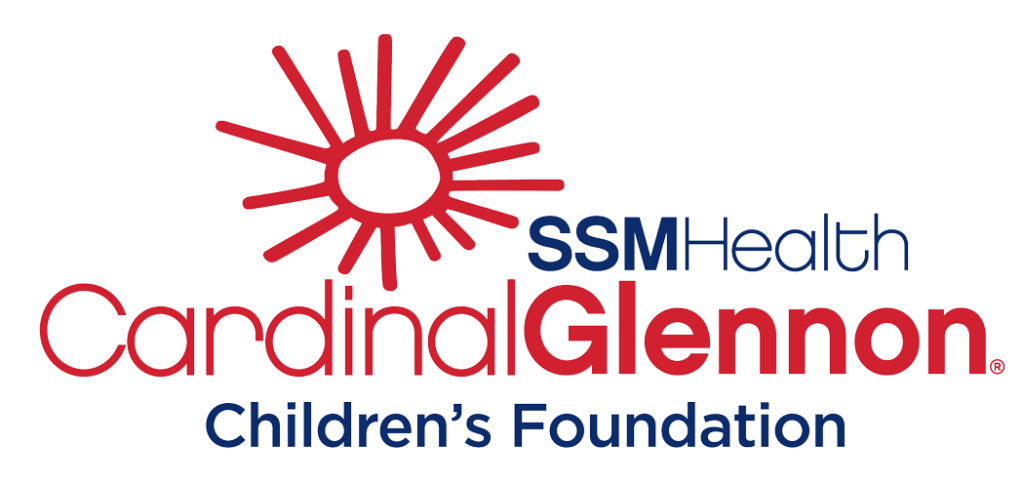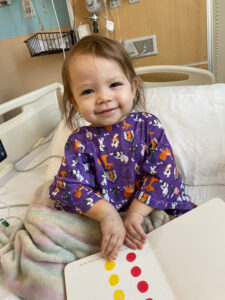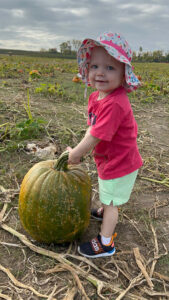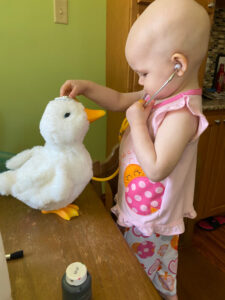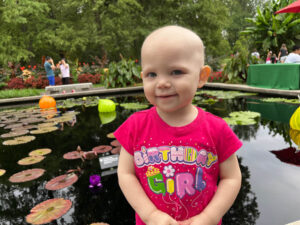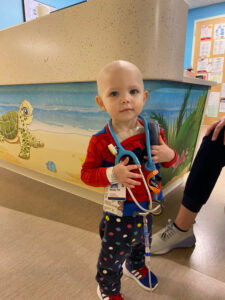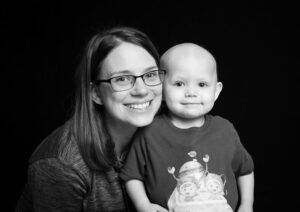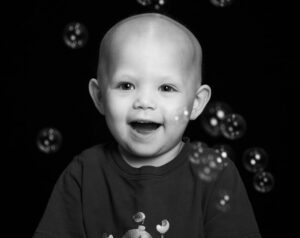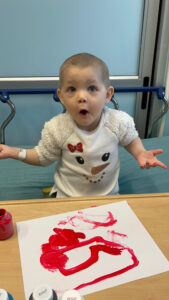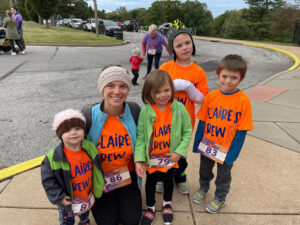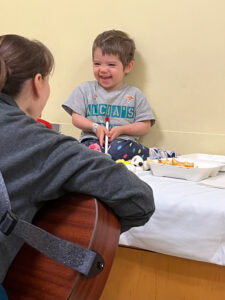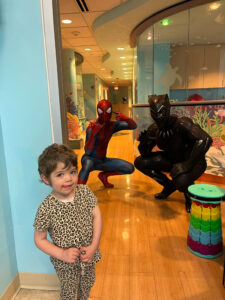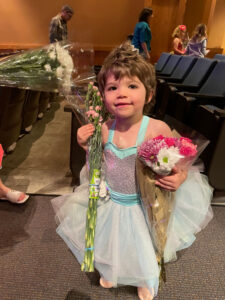Our Patients:
Claire Gilligan
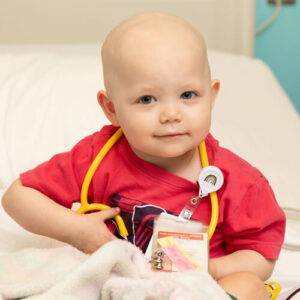
A child is diagnosed with cancer every 3 minutes. Approximately 1 in 285 children in the U.S. will be diagnosed with cancer before their 20th birthday. Becky and Ryan Gilligan are blessed with 5 children. Claire, their second youngest is one of the 285.
“It started with respiratory symptoms,” said Becky, Claire’s mom, as she reflected upon the beginnings of Claire’s illness in September 2022. “She was about 15 months old. It was my mother-in-law’s birthday, and Claire began having trouble breathing on a Sunday night at home. We did the steam shower and the nasal aspirator, as well as making sure her bed was elevated. But we saw no relief. We called the pediatrician in the morning and were seen. There they gave a dose of Albuterol, which didn’t have the desired outcome, so we were sent to the Emergency Room. We brought her to the Emergency Department at SSM Health Cardinal Glennon,” Becky said. “Of course, once we got to the ED, she seemed better. But this cycle of respiratory difficulty happened every two weeks for about 6 weeks,” Becky said. “It got so bad in November that she landed in the pediatric intensive care unit. A combination of pneumonia, pleural effusions, and rhinovirus earned us a five day stay in the hospital with three days in the PICU and two days in the Transitional Care Unit (TCU). At the end of that stay, we were discharged home with instructions to follow up with our pediatrician.”
Two days after discharge, Claire struggled with her breathing yet again. She returned to the Emergency Department, was admitted to the TCU and spent 6 days there on IV antibiotics for a suspected respiratory virus. “This pattern of getting sick over and over again was just so unusual for Claire,” said Becky. “She had really never been sick her whole first year of life but now we were in this cycle over and over again. She was too young to diagnose with asthma but at discharge, she was essentially put on an asthma-like treatment plan and managed with medications such as albuterol, Flovent and steroids. Between 15 and 18 months of age, Claire had ear infections, viruses, and more antibiotics and medications than I can remember. We knew we needed to see a pulmonologist and fortunately, our pediatrician was able to arrange a consult in mid-December with Dr. Kurt Sobush at the Glennon clinic in Lake St. Louis. Our own efforts had us waiting for at least another 6 weeks, so we were grateful to get her in,” said Becky.
“When we saw Dr. Sobush, he had Claire get a chest x-ray and that x-ray showed that she had a lot of fluid around her lungs. He sent us to Cardinal Glennon and suggested we go through the Emergency Department. He wanted to admit her for IV antibiotics, an ultrasound of her lungs and some bloodwork including a complete blood count. The ultrasound wasn’t as clear as Dr. Sobush had hoped so he ordered a CT scan, as well. I had a bad feeling in my gut,” Becky said. Claire’s white blood cell count (WBC) was exceptionally high. Her red blood cell count (RBC) and platelet counts were low. While her sample was being re-run by the lab, Becky had two doctors introduce themselves. The first was Dr. Albers. He was the on-call pulmonologist. He explained to Becky that Claire would be admitted for hospitalization but that he wasn’t sure it would be to his service. Next to follow was Dr. Deepika Bhatla, the on-call physician for the hematology-oncology service.
“She asked if I was here by myself,” Becky said. “I felt that she was going to give me bad news, as she was asking about our family’s support system. My mom worked with someone whose son had been diagnosed with leukemia. My uncle also had a blood cancer. Claire had been eerily sick for so many months so the combination of all those things coupled with the results of her blood counts had me suspect this could be what was wrong with Claire. Dr. Bhatla told me to call my husband, Ryan, so that she could speak to us both at the same time. Once we got Ryan on the phone, she confirmed that Claire most likely had leukemia. Somehow, I could say the word leukemia, but I couldn’t bring myself to say the word, cancer. She said we were going to be admitted to the inpatient oncology unit (4 North) and to plan to stay for at least 30 days as Claire’s treatment got underway. Within the next 24 hours, Claire was going to need a bone marrow biopsy, a central line placed and a procedure to drain the fluid off her lungs to rule out if that fluid was infection or filled with leukemia cells.”
In shock, Ryan and Becky called both sets of parents and discussed a plan to manage being present for both Claire and our other 3 children. They decided that the other 3 kids would stay with Ryan’s parents for the first night at Glennon so that Ryan and Becky could both be with Claire and determine the best schedule for the remainder of her first month at Glennon. As the winter holidays of Christmas and New Year’s approached, Ryan and Becky navigated their new normal as best they could. Chemotherapy and hospital time replaced Claire’s usual play and time with her 3 siblings.
Becky was expecting their 5th child, Baby John on 1/11. Still on the heels of the pandemic, there were no sibling visits allowed in the hospital. The two parents alternated being with Claire each night, “data-dumping” the day’s activities and progress updates like two ships passing in the night. “I spent Christmas Eve at the hospital with Claire and Christmas day with my other kiddos. Ryan spent Christmas Day with Claire, etc., etc. etc., and that was essentially our cadence back and forth,” Becky said. “Looking back, I am so grateful for all the encouragement given to us from our care team to continue our home routine as much as possible. They fully supported us attending Christmas programs for our preschool kids and supported a once per week dinner at home with both of us there by ensuring that whatever updates they had were given to the grandparents who were with Claire, but they also followed up with us directly through a phone call to ensure all information was passed on. During our weekly dinner at home, whoever was at the hospital would come home and we would all have 1 meal together while Ryan’s parents sat with Claire. This helped the other kids realize they were still important and adjust healthier to the abrupt change in our routine,” Becky said.
“So much of that first month is learning and surviving. While I was in it, I didn’t think it was bad as everyone says. But truthfully looking back, it was much harder than I admitted during the time. Everything is new and it’s a lot to learn and remember. What you finally absorbed today is information you needed to know and understand 3+ days ago. People who don’t live in a medically complex world don’t understand how hospital time works. I gained a new appreciation for allowing people to communicate updates at their own time and pace. It was also important to understand how Ryan and I both communicated best and how to best distribute information to family and friends. Our 4 North nurses were a crucial resource during this life adjustment. Not only do they administer the medications and serve as the link between the families and doctors, but they are this crucial sounding board for us as parents. People in your village have the best intentions and want to help, but unfortunately, it’s impossible for them to fully understand the new reality that you have. The nurses are the people that you can talk to and who know the new world you are now a part of. They know that a cancer diagnosis affects the entire family and that the entire family must be cared for to ensure the best outcome for the patient. It’s one of the things that really sets the culture of Cardinal Glennon apart. It’s a reason I will forever tell people how amazing it is,” Becky said.
The effects of induction chemotherapy hit hard for Claire from mouth sores and acid reflux to hormone changes and neuropathies. “Initially, we spent almost every afternoon and evening walking laps in the hallway for hours at a time. By the end of the first week of induction, she wasn’t able to walk at all. Luckily, at the end of induction she was able to walk again, even though her stamina was significantly lower than when we started induction chemotherapy, Becky said. “Induction definitely trained us and gave us a taste of what to expect. I was grateful for the gifts of the playroom and music therapy for Claire. These outlets were some of the only things keeping her spirits up during these weeks of isolation.”
Claire was discharged on 1/14/23 just before the birth of her new little brother, John. “My induction was scheduled for 1/17. I’m so glad that she got to come home before that day – but that also meant that I would miss her first return visit to the Costas Center and her PET scan which would tell us if she was in remission,” Becky said. “I learned that I was just going to have to be comfortable with the uncomfortable. We were a family of 6, soon to be 7, so we all just had to do our best to control what we could control and keep moving,” Becky said. “Claire’s grandma took her to her appointment and her PET scan confirmed a clinical remission. I remember Dr. Hugge taking the extra step to call me. That wasn’t something he had to do or that anyone asked him to do. That’s just how intuitive our doctors are, how well he understood me and how torn I felt, and how much he knew how that direct call from him to me would matter, instead of hearing the information from my mom,” Becky said.
Once Claire’s Induction stage was over, she entered the second phase of her therapy. “There are all kinds of phases throughout her 3-year therapy plan,” said Becky. “There’s a Consolidation phase, an Interim Maintenance phase, a Delayed Intensification phase, an Interim Maintenance II phase, a Maintenance phase – and each one looks a little different as far as the medications and amount of time in the hospital. We learned early on to keep a travel bag ready in case Claire got sick in between her scheduled admissions. She had a few admissions for fevers and unfortunately had COVID twice, as well. We started our Maintenance phase in October 2023, which brought us fewer overnight stays in the hospital, but not necessarily less challenges. Claire developed hyperinsulinism, likely as a result of one of her chemotherapy drugs. This meant she frequently had low blood sugar, and we had to monitor her levels at least 6 times/day for several weeks. She still has some regulatory issues even now, so we follow up with her endocrine specialist as needed. We will be in this Maintenance phase until she completes her roadmap of therapy in late 2025,” said Becky. “Every 3 months she has a spinal tap, and she has bloodwork done every 3 weeks. She takes one oral chemotherapy drug daily, and others less frequently. Besides her oncology team, the only specialists she sees are endocrinology (for her blood sugar monitoring and hyperinsulinism) and pulmonology (to follow her for both long term effects and also establish a new baseline for her once treatment is over.”
As Claire approached the 1-year anniversary of her cancer diagnosis, Becky wrote individual thank you notes to each and every member of Claire’s Costas Center care team. “I am so immensely grateful to each nurse, each nurse practitioner, each doctor that is a part of Claire’s care. They never discount me. They consider my observations critical. They see me as the expert on Claire, even though THEY are the experts of her leukemia,” said Becky. “Each staff member is always willing to find answers to all my questions and we are truly treated as an entire family vs. them just being present for Claire. We still have a long way to go, but my mindset has drastically shifted,” Becky said. “I will never look through life with the same lens again, and although we have a large family already (and growing still again with baby #6 on the way), we have added to that family with our family at Cardinal Glennon. We are forever grateful to friends and family – everyone who continues to show up in support of not just our immediate family, but the hospital family who cares for us.”
